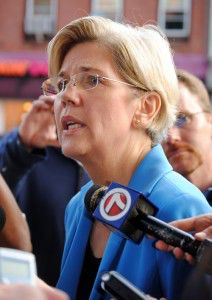

Massachusetts Senate candidates Elizabeth Warren and incumbent Sen. Scott Brown are neck in neck, according to a recent University of Massachusetts-Amherst poll.
The study, conducted by YouGov America, used a sample of 500 Massachusetts adults to collect the results. Within a margin of error of about 4 percent, 43 percent of the poll’s participants said they would vote for Warren, while 39 percent favored Brown.
Brown, a Republican, was elected after the death of former Sen. Edward Kennedy, and his election ended the 60-vote Democratic majority in Congress.
Valerie Kaplan, Boston University College Democrats communications director, said in an email that Brown’s lack of effort in Congress might have played a role in Warren’s growing popularity.
“Brown could have done more in Congress as at the time he was the 60th vote, but he didn’t take that opportunity,” Kaplan, a BU College of Arts and Sciences senior, said.
In terms of Brown’s current approval ratings as Senator, the poll reported that 37 percent of the participants strongly or somewhat approved of Brown, but 49 percent strongly or somewhat disapproved of Brown.
“The electorate may want someone who would take opportunities to get things done for the issues that matter to people in Massachusetts,” Kaplan said.
The poll also asked participants to describe both Warren and Brown in one word. For Warren, the most common word was “liberal,” but for Brown, the most common word was “moderate.”
Stacey Stephens, a Sargent College of Health and Rehabilitation Sciences freshman and member of the BU College Republicans, said in an email that she attributes these descriptions to the leftist electorate in Massachusetts.
“With Warren being described as ‘liberal’ and Brown as ‘moderate,’ I would say it reflects a movement leaning to the left in the voter pool,” Stephens said.
Kaplan also said that the Commonwealth’s liberal electorate influenced these descriptions.
“Massachusetts has been traditionally a blue state and more liberal, which is shown through who is elected,” she said.
However, policies are the most important indicator of voters’ preferences, according to the poll.
Most Massachusetts voters, it stated, trust Warren more than Brown to handle the issues of health care, taxation and the economy. But American trusted Brown more to handle the issue of terrorism.
“People now may want someone that would handle issues that directly affect them better, especially in today’s economy,” Kaplan said. “While terrorism is an important issue, a lot of people are concerned about the unemployment rate, and how the economy is doing and this is reflected in who they would vote for.”
Stephens said that social issues may also have played a role in the poll’s results.
“Brown is fiscally a conservative, but his stand point on social issues tend to be more liberal than the typical conservative,” Stephens said. “I think social issues are on the rise to being more important than they have in the past.”



















































































































